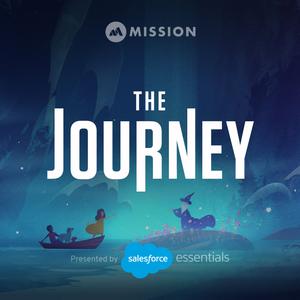
The Journey
Mission.org
- 18 minutes 46 secondsVenturing into Solopreneurship with La Vaca Founder and CEO Emily Vaca
Emily Vaca, Founder & CEO of LA VACA Designhouse, talks about having a one-in-a-million idea, designing the iconic MINNIDIP pool, and what it’s like to take a huge bet on yourself.
Tune in to learn:
- What it’s like to balance creativity and art (4:30)
- Why 4 am can be a game-changer (4:00)
- How to gain the courage to take a bet on yourself (29:00)
This season of the Journey is produced by Mission.org and brought to you by UPS. To learn how UPS can help your small business, go to https://UPS.com/pivot.
Mission.org is a media studio producing content for world-class clients. Learn more at
30 March 2022, 7:00 am - 23 minutes 22 secondsWhat Does Resiliency Look Like? With Steve Denton, CEO of Ware2Go
Steve Denton didn’t grow up knowing how to be accountable, he had to learn that skill throughout his life. Along the way, accountability turned into dependability and, more importantly, resiliency, which has helped him see his way through a journey filled with highs and lows.
Tune in to learn:
- What does it take to learn accountability? (4:00)
- Why you don’t necessarily have to be better, you just have to be different. (5:55)
- How Steve decided to leave the corporate world and dive into entrepreneurship. (7:10)
- When his company was facing hard times, what kept Steve working to save it? (10:50)
- What lessons do you learn when you enter into a leadership role? (14:00)
- Why joining Ware2Go was such an enticing opportunity for Steve. (15:45)
- How to bring unity to an organization. (18:47)
This season of the Journey is produced by Mission.org and brought to you by UPS. To learn how UPS can help your small business, go to https://UPS.com/pivot.
Mission.org is a media studio producing content for world-class clients. Learn more at
23 March 2022, 7:00 am - 14 minutes 43 secondsSolving the Unsolvable Problem with Tini Lux Founder & CEO Jackie Burke
Jackie Burke wasn’t interested in being an entrepreneur. As an engineer, she was very risk-averse. But when her own skin allergy had her searching for a hypoallergenic earring and coming up empty, she felt called to solve a problem - and in the process, started a business, Tini Lux, that has since become a solution for folks with sensitive ears everywhere.
Tune in to learn:- What it’s like to be a risk-averse entrepreneur (3:00)
- How to create an idea from a problem (4:45)
- How Emily balanced a day job and side hustle (6:00)
- The challenges of being a first-time founder (8:00)
- The importance of “radical transparency” (9:00)
- The struggle of keeping personal touches while scaling (10:40)
- What is Tini Lux Looking to Next? (14:00)
This season of the Journey is produced by Mission.org and brought to you by UPS. To learn how UPS can help your small business, go to UPS.com/pivot.
Mission.org is a media studio producing content for world-class clients. Learn more at mission.org
16 March 2022, 7:00 am - 18 minutes 21 secondsThe Advantages of Adapting with Richer Poorer Founder & CEO Iva Pawling
To be an entrepreneur is to be constantly adapting. In a world where the market is ever-changing, it’s important to be able to shift, to refocus and rebrand… to be ready for whatever is coming next. Iva Pawling, the Founder & CEO of Richer Poorer, a California-based inner wear company with a cult following, knows a thing or two about having to think on the fly.
“It was completely the opposite of what we expected, and they ended up filing for bankruptcy within thirteen months of acquiring us,” Pawling said of Richer Poorer’s ill-fated acquisition. “It was just insane. It really taught me to always have a Plan B. Like… if things don’t go how you plan, how are you handling it?”
So how did she handle it? How did Richer Poorer survive huge obstacles like a failed acquisition, over-complicated marketing tactics, and a major supply-chain stallout? Find out on this episode of The Journey.
Main Takeaways:
- Sometimes, it’s okay to not run on pure passion: The old saying goes something like this: “Motivation is for amateurs, discipline is for professionals.” There might come a time when a brilliant opportunity presents itself, but it’s not something that completely lights your fire. It’s not your dream. There are times when you might need to look at the bigger picture and think long-term. It might not be the most exciting thing, but maybe it’s the right next step. Successful careers take both passion and smart moves done at the right time.
- Pay if forward: When Iva was just starting out, she reached out to a lot of her contacts, all of whom were eager to point her in the right direction. That’s because, she explained, that all entrepreneurs have had someone do the same for them when they were just starting out. The business world can be very cutthroat, but it can also be full of camaraderie. Keep an eye out for those moments when you can help someone… it will come back to you, eventually.
- Vulnerability can be a strength: Every business will face curveballs and moments of uncertainty. Good leaders will turn to their team and ask for help with blind spots instead of pretending to have all the answers. By being vulnerable, you invite your team to find the best solution.
---
This season of the Journey is produced by Mission.org and brought to you by UPS. To learn how UPS can help your small business, go to UPS.com/pivot.
9 March 2022, 8:00 am - 13 minutes 24 secondsStanding Out in a Crowded Market with Paume’s Founder & CEO Amy Welsman
Any entrepreneur is going to face competition – it’s the nature of the game. All you can do is make your product the best it can be and hope that your consumers feel the same. But sometimes, your timing is unique, making that competition even fiercer than normal.
Amy Weisman had her work cut out for her. After she had her first baby, she knew two things: she wanted to use her entrepreneurial prowess to carve out an idea of her own, and she hated the smell and feel of the hand sanitizer she was constantly pouring all over her hands. She had an idea for a sustainably-packaged, germ-killing line of hand care products that people liked using. The only catch? She was launching this business in the middle of a global pandemic “I was confident enough at the time… I knew that if people just tried the product, they’d come back for more. I knew I had a special formula that was different and that stood out.”
She was right. Amy is the Founder & CEO of Paume, a global hand care brand that is taking the world by storm.
Main Takeaways:
- Learn as much as you can: The idea of starting your own business can be exciting and terrifying – but nothing will compare to actually getting out there and actually doing it. It is important to try, as much as you can, to understand the world you’re jumping into before you do it. In Amy’s case, she worked with a start-up for four years before she decided she wanted to try it for herself, so she knew what she was getting into when things got tough.
- Keep your eye out for the good idea right in front of you: Always be looking for that next great idea… it might show up where you don’t necessarily expect. Some of the best businesses have come from small, everyday moments where someone was paying attention to how they could make the world a little better.
- Prepare to stand out: If you’re going to join a crowded market, know what it is about your product that will make it stand apart from the crowd. You’ve got to know what it is your offering that your competitors aren’t, and be ready to talk about it.
---
This season of the Journey is produced by Mission.org and brought to you by UPS. To learn how UPS can help your small business, go to UPS.com/pivot.
2 March 2022, 8:00 am - 16 minutes 14 secondsBuilding Hydro Flask and Finding Purpose in Entrepreneurship with Travis Rosbach
The road to entrepreneurial success is long. It’s tedious. And there are points where it might make more sense to cut losses than it would be to keep forging onward. But sometimes, an idea gets bigger than just you – it becomes a movement… something that changes lives.
“I was like, what happened, why do you not have water bottles,” Travis Rosbach said. “Because I did rock climbing in college, and I knew plastic water bottles were the way to go – the non-single use kind. And he said they didn't have any because of this stuff called BPA. He said ‘We're not really familiar with what it is or how serious it's going to be, but we pulled all the bottles just as a precautionary measure.’ And so it just came out my mouth: ‘I will do that.’”
Travis isn’t your typical entrepreneur – he’s far more comfortable in a scuba suit and a business suit, but he knows firsthand what it’s like to have a business take on a life of its own. He’s the co-founder of Hydro Flask, the most-used water bottle in the world, which he built by taking an $11,000 investment and turning it into a $210 million dollar household name. And he did it while facing seemingly insurmountable odds. Hear his story on this episode!
Main Takeaways:
- Teach yourself: The best way to learn isn’t always in an expensive MBA program or ivy-league college. Some of the best knowledge you’ll ever encounter can be found in the pages of books. Read, study, and absorb the lessons of those who have made a living doing what you want to do.
- Find the Answers Yourself: If you stop at the first challenge, you’ll never hit paydirt. If people tell you that what you want to do isn’t possible – find a way. Travis was told that there wasn’t a company in the world that could make his innovative new water bottle – so he went to Shanghai and found one himself.
- Find a Reason to Push Through the Hard Stuff: Running a business isn’t easy, but keep your eyes on why you started: why you began this journey in the first place. That reason will help you keep going when there are thousands of reasons to quit.
---
This season of the Journey is produced by Mission.org and brought to you by UPS. To learn how UPS can help your small business, go to UPS.com/pivot.
23 February 2022, 8:00 am - 15 minutes 11 secondsDisrupting the Beauty Binary with Matthew Herman of Boy Smells
The world often wants to put people into boxes, to sift everyone into categories. It just seems easier sometimes: rich or poor. Successful or not. Worth listening to or worth tuning out. Right or wrong. Male or female. But there are people who are pushing back on those categories – people who believe that life can be richer without harshly-drawn lines. Matthew Herman of Boy Smells — a rapidly-expanding queer-owned personal fragrance and product brand — is trying to change that.
“For us, it’s just about showing up… whatever way you want to show up, it’s right,” Herman said. “And you can show up differently every single day, because you are whoever you want to be. And that’s great.”
Herman cut their teeth in the fashion world, working for innovative brands like NastyGal. When they talked about the issue of binary luxury with friend and business partner David Kien, they discovered a hole in the industry: a place where comfort was non-binary.
“We had been talking as individuals — or even men — who weren't shopping at Levi's or these kinds of more rugged, stereotypically-masculine stores,” Herman said. “We thought, ‘It’d be great to have this store with home stuff, but fashion and all sort of other things.’ And then we were [said], ‘Well, let's start with one thing. Let's just think about like candles.’”
The result was Boy Smells, a brand focused on identity, specifically its concept of genderfulness. This idea implores a new kind of consumer — namely the 18-25 set — to harness their power across the gender spectrum and oppose traditional marketing nomenclature like “genderless” or “gender-neutral.” On this episode, Matthe explains what it all means, how he worked to create this concept from his own kitchen, and what it took to ship and scale during a pandemic.
Main Takeaways:
- Follow the Curiosity: Sometimes, the path to success isn’t as linear as we’d like. It has winding detours and setbacks. But if you find something you’re passionate about – something that makes you excited and curious — you can find yourself at the threshold of opportunities you never would have seen had you played it safe.
- Roll Up Your Sleeves: As we all know very well by now… the world can change in an instant. You might not think you’ll be in charge of certain aspects of a business, but be ready to jump in when you’re needed. Helming an endeavor means being ready to handle things that you never thought you’d be handling, and mastering skills you never thought you’d have to learn.
- Don’t be the smartest person in the room: Great leadership is the leadership that has wise counsel and takes into consideration the thoughts of others. Bring people in. Ask questions. Take advice – your business will be better for it.
---
This season of the Journey is produced by Mission.org and brought to you by UPS. To learn how UPS can help your small business, go to UPS.com/pivot.
16 February 2022, 8:00 am - 13 minutes 7 secondsFollowing Passion to Unexpected Places, with Raili Clasen, Owner of Raili CA Design
When Raili Clasen’s interior designer left just a week into the job, Clasen was left looking at a massive project that seemed daunting. But when she listened to her gut and decided to take a swing at designing the space herself, it opened up a world of possibilities that launched an incredibly successful business.
“So I bought some business cards,” Clasen said. “I didn't have a website. I obviously had nothing, but I put some business cards out on the table and at that point was like, ‘Well, if these things are gone at the end of the day, then maybe I'm doing something cool. Maybe someone will hire me.’ That's how it started.”
Clasen would be the first to tell you that she didn’t expect to wind up as one of the most successful interior designers in California. She just knew two things: she loved design, and she needed to make a living. She followed that inclination and founded Raili CA Design. What happened next and how did Raili learn to go from being not just a designer but an entrepreneur, a business owner, and a leader? Find out on this episode.
Main Takeaways:
- Be your own advocate: Sometimes, growth will only happen when you speak up for your talent and put your work in front of others. Leave your business cards on the table. Make the calls to see if someone wants to collaborate. Connections don’t just happen, and clients don’t just drop into your inbox. Use the network you have to seek out any and all opportunities.
- Be ready to wear multiple hats: Launching and growing a business means that you’ll be doing more before you can do less. Find ways to be comfortable learning about payroll and customer service – it might be a while before you can delegate those to others.
- Don’t be afraid to go against the flow: Following your path might look different than the process everyone around you is going through. It’s easy to compare other careers against your own journey, but resisting that urge will help you keep your eyes ahead at what’s coming down the pike for you.
---
This season of the Journey is produced by Mission.org and brought to you by UPS. To learn how UPS can help your small business, go to UPS.com/pivot.
9 February 2022, 8:00 am - 15 minutes 59 secondsSolving Everyday Problems with Innovative Solutions with Kelly Higney, Founder of Bug Bite Thing
When Kelley Higney moved to Florida, she knew she’d face some challenges: She was a young mother in a new state. She was in a new house in a new town. But there was one problem she didn’t expect: her daughter’s severe reactions to mosquito bites. Higney would watch helplessly as her six-month-old daughter’s limbs would swell just minutes after being bitten. After trying everything she could – every ointment, every gimmick – Higney knew she was going to have to find an answer on her own. She did some research, and found an answer in a strange little tube: a suction tool that could pull the venom and saliva out of the bite, stopping the allergic reaction before it even had the chance to start.
“I started testing with just this one little sample I had purchased on friends and family,” Higney said. “Everybody was getting similar reactions and that's when I'm like, okay, maybe I'm onto something. So I was able to get in touch with the factory. I pitched them my idea. I told them that every mom and everybody that was suffering here needed to know about this product because it's, it was life-changing for me and my family.”
So how did Kelley take a quest to help her daughter and turn it into a powerhouse company with products in 25,000 retailers and 25 different countries? Find out on this week’s episode of The Journey.
Main Takeaways:
- Don’t Be Afraid to Start Small: Good ideas rarely explode overnight, and good entrepreneurs know the value of a slower start. Most businesses need to grow and evolve slowly, and it’s an entrepreneur's job to find customers whoever and wherever possible, even if it means pitching and selling at a local market or your child’s school functions.
- Surround Yourself with People Who Can Help You Grow: Regardless of when or if your business takes off, you need to have a network of people to lean on and learn from. Find people you admire — even within your own family — and tap into them for advice, feedback, or support to take your business to the next level.
- Protect Your Product: Good ideas and successful products will always be met with copycats. To ensure that those imitators don’t steal your market share, do your homework and take the steps necessary to protect yourself.
---
This season of the Journey is produced by Mission.org and brought to you by UPS. To learn how UPS can help your small business, go to UPS.com/pivot.
2 February 2022, 8:00 am - 20 minutes 49 secondsThe Best Leaders Can See the Big Picture and Small Details All at Once with Francois Kress of Feelmore Labs
If you’d asked Francois Kress what he thought he was going to be when he grew up, he probably would have told you that he was going to be a mathematician. It seemed like a very obvious answer, given his background. But life had other plans, and now Kress has arrived at the top of an industry he never expected, running a company he never could have foreseen. But it turns out that his different path gave him the ability to see things in a way others might not. And merging his love of science and entrepreneurial spirit with more than twenty years of experience running luxury brands resulted in something powerful but opposite of everything Francois has ever known: a start-up called Feelmore Labs.
“Five years ago I was invited to join [the] first board of the company, Feelmore Labs,” Kress said. “Very quickly, we decided that I should run it, as well, because it was a great combination of science, tech, and complicated consumer branding.”
And Kress is uniquely positioned to be the perfect person to bring all three of those things together. Since taking the helm, Feelmore Labs has been at the forefront of some very exciting scientific breakthroughs. One of its products, Cove, is a device that can positively change the trajectory of your mental health simply by activating the receptors in your skin.
But how did Kress – a giant in the luxury brand world – wind up taking the helm of a groundbreaking lab? What qualities gave him the unique qualifications to walk Feelmore Labs through the complicated and rigorous process of creating, vetting, and marketing an entirely innovative product? Find out on this week’s episode of The Journey. And, just for Journey listeners, you can use the promo code Mission20 to receive 20% off your order with Feelmore Labs!
Main Takeaways:
- Follow the Passion: Even if you have found success in an industry or throughout your career, it is possible to be unsatisfied. Don’t settle just because you have reached the top of your field and still feel like there is a void. Follow your passion, take risks, and don’t be afraid to try something new, because you may find something that will fulfill you more than you thought possible.Francois never thought that he would wind up heading entire regions of business for the world’s most recognizable luxury brands. He thought he would pursue a career in academia, just like his parents. But when he found that he had talent in an industry that was, at first, foreign to him, he pursued it, and his work ethic and natural talent took him all the way to the top. However, when he found himself experiencing “luxury fatigue”, he found the strength to change his trajectory and return to his first love: science.
- Zoom in and Zoom Out: Francois’s different background is not a weakness – it is a strength. His time working in the luxury world allowed him to assess products on a national and even global scale. On the flip side, his love of science allows him to zoom in on small problems and find solutions. These contrasting views, when combined in a leader, is incredibly powerful. Use all of your experience and tools in your toolbox to zoom in and out on your own challenges, and never stay too focused on one thing that you forsake everything else.
- Be Patient: Francois knows that success doesn’t come overnight. When Feelmore Labs’their innovative product, Cove, was met with skepticism, Kress and his team didn’t give up on it. Instead, they focused on putting the product through even more stringent testing and studies so that he can bring the strongest product to market when it is time.
---
This season of the Journey is produced by Mission.org and brought to you by UPS. To learn how UPS can help your small business, go to UPS.com/pivot.
26 January 2022, 8:00 am - 17 minutes 37 secondsPivoting to Progress with Nadine Fonseca, Co-founder, Mighty Kind
Plot twits might be fun to read about in a story, but when it’s your life that’s getting upended or dramatically changed, you might not like it as much. Dashed dreams are among the hardest to pivot away from, because where do you go? Nadine Fonseca, co-founder and CEO of Mighty Kind, knows all too well the mental struggles that come with finding out that you have to leave a precious dream behind.
“After injuries and rehabilitating physically and kind of mentally from that, it was a real struggle to figure out who I was and who I wanted to be,” Fonseca says. “I spent a lot of time just working jobs to work jobs and I think just trying to figure out, was I an entertainer? Was I an academic? What was I meant to do with the rest of my life?”
This wasn’t the last time that Nadine came face-to-face with a seemingly impossible question that forced her to change course. At this point, Nadine has changed and pivoted so many times throughout her life and her career that she barely even bats an eye when the world throws a wrench in her plans. But how did she get to that place? And how did her path ultimately lead to Mighty Kind, a kids magazine that puts tough topics front and center? Find out right here on The Journey.
Main Takeaways:
- Pivoting At The Least Convenient Time: Changing your business plan at any point is inconvenient at best, but sometimes re-doing work is worth a herculean effort. Being objective about what’s going to work for your business long-term and being honest about what you can handle will go a long way in helping you see hard changes to make.
- Just Because You Can ‘Do it on Your Own’ Doesn’t Mean You Should: Maybe you thought about your business one way, but now, as you get closer to launch, you’re realizing you don’t have the bandwidth, or maybe even the right skill set to do it all on your own. The solution is simple, you need to get help, and there’s no shame in that. The smartest and most successful leaders can identify their blindspots and bring in the talent to fill them, which benefits the entire company.
- Pivoting and Thriving: Those who are the most pliable are the least breakable. At every point, being able to shift the business toward what you can see is going to work better is a good investment. When an opportunity arose out of a crisis, Nadine found that being nimble and shifting the business to digital turned out to be the best move.
---
This season of the Journey is produced by Mission.org and brought to you by UPS. To learn how UPS can help your small business, go to UPS.com/pivot.
19 January 2022, 8:00 am - More Episodes? Get the App
Your feedback is valuable to us. Should you encounter any bugs, glitches, lack of functionality or other problems, please email us on [email protected] or join Moon.FM Telegram Group where you can talk directly to the dev team who are happy to answer any queries.
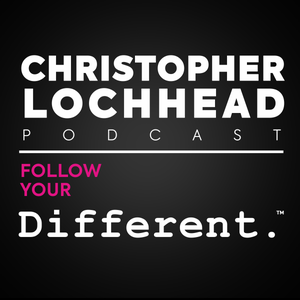 Christopher Lochhead Follow Your Different™
Christopher Lochhead Follow Your Different™
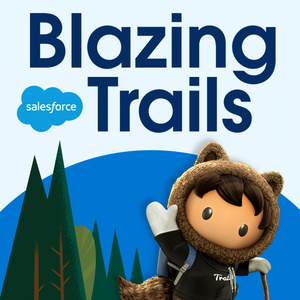 Blazing Trails
Blazing Trails
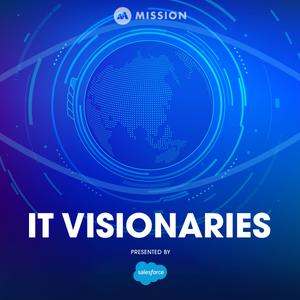 IT Visionaries
IT Visionaries
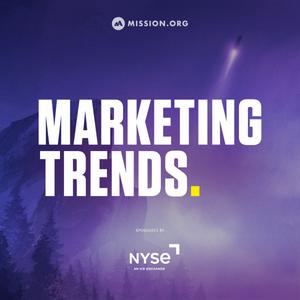 Marketing Trends
Marketing Trends
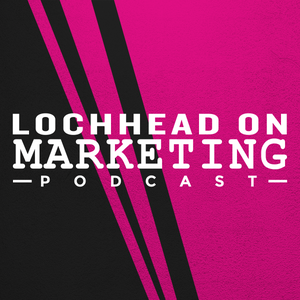 Lochhead on Marketing
Lochhead on Marketing